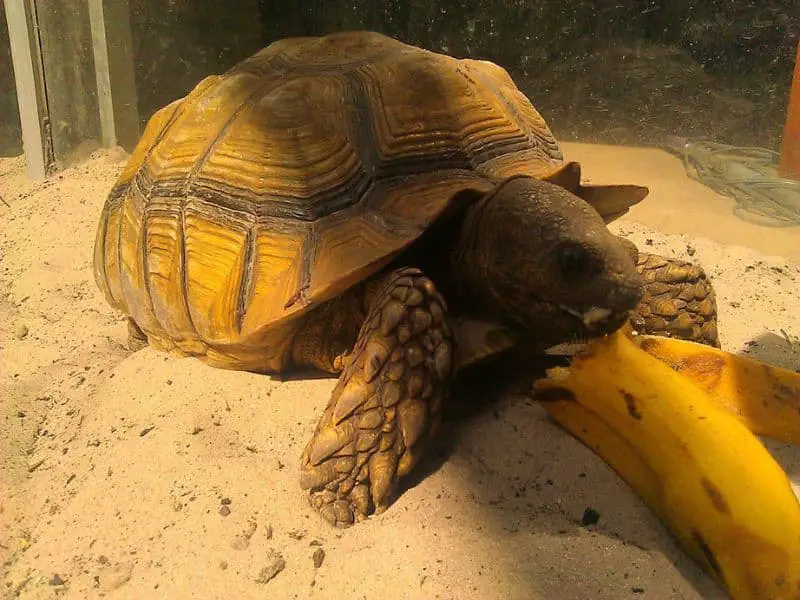Some turtles are carnivorous, and their main diet includes meat or flesh of other small animals. However, most turtles are omnivores feeding on small animals, plants, vegetables, or fruits such as bananas. Bananas are rich in vitamins, minerals, and fiber, which can benefit your turtle. For instance, the fiber in the banana helps them pass stool easily.
So, if you were wondering if turtles can eat bananas, the answer is yes. Bananas are safe for most turtles, including box or adult painted turtles. Although they can eat bananas, don’t give them too much of it because bananas are high in sugar. Feeding your turtles bananas consistently may result in some serious health issues.
You can also give your turtle small amounts of kiwi fruit, blueberries, grapes, and watermelon. Slice the fruits into small manageable chunks if you are feeding baby turtles. Here we will discuss how to feed your turtles bananas, whether it is healthy for your turtle to eat the banana peels and the benefits of bananas to your turtle.
Can you feed turtles bananas?

Yes, your turtle can feed on bananas. They contain potassium, magnesium, and vitamin B6, which are generally suitable for your turtle’s health. The banana nutrients can help heal and protect your turtles from some aquatic diseases.
Since bananas are considered only a treat to turtles, their overall diet should contain no more than 20% of bananas. It is advisable to take note of your turtle’s behavior when feeding it with bananas.
If it positively responds while eating, then it loves the fruit. However, if your turtle reacts negatively, do not add bananas to its diet.
Do the same for any other fruits you’d like to give your turtle. Keep reading for some alternative fruits for your turtles and how to portion the fruit for them.
Can turtles digest bananas?
Your turtle can eat bananas and perfectly digest a small amount of them. But don’t give your turtle bananas daily. Consistent consumption of bananas can cause bloat and diarrhoea to your turtle. It can also result in digestive problems.
How to feed a turtle banana
Here, you will learn more about how to feed your turtle bananas. Let’s get started.
- Peel the banana before feeding it to your turtle
- Add a small portion of banana to your turtle’s food
- Chop the banana into small manageable chunks for the baby turtles
- Mix banana with some vegetables and fleshy foods for a balanced diet. That will help your turtle to eat the bananas without any resistance.
While the turtle feeds, observe how it responds to the banana. Does it respond positively or negatively? If it does not like the banana portion, avoid it. But, if your turtle loves bananas, feed it with the fruit at every 3rd or 4th feeding.
Swap bananas with other fruits. Note how your turtle behaves while eating each fruit.
Can turtles eat banana peels?
No, do not feed your turtle banana peels.
Here are some reasons you should not feed your turtle banana peels:
- Turtles are toothless animals. Therefore, they cannot eat the hard banana peels.
- Banana peels may have toxic chemicals like pesticides and insecticides from the farm, making them unsuitable for turtles.
- Banana peels are not easy to digest. They may cause loose bowel movements in turtles.
Nutritional facts about bananas
Bananas contain vitamins, minerals, sugar, fats, calories, and many more nutrients.
Vitamins in Bananas for turtles
Bananas are a good source of vitamin B6. One banana has up to 37% of this vitamin. Vitamin B6 gives your turtle energy for growth, travelling, and reproduction. Your turtles will often feel tired without this vitamin.
Another vitamin found in bananas is vitamin C. One medium-sized banana contains 8.8 grams of this vitamin. Vitamin C helps with the development and maintenance of your turtle’s bones. It is also essential for your turtle’s shell since it is made of bones.
Besides vitamin B6 and Vitamin C, other essential vitamins found in bananas are vitamin A, Vitamin K, and Vitamin E.
Minerals in Bananas
Minerals are also crucial elements found in bananas. They include;
Magnesium of up to 27 mg and calcium of about 5 mg. Magnesium and calcium lower the acidity of your turtle’s body and increases its resistance to diseases.
Bananas also contain 359 mg of potassium and 22g of phosphorus that the turtle needs for general health. Other minerals present in bananas include; Zinc, Copper, and Iron. Learn more about the minerals in bananas in the table below.
Carbohydrates for turtles
Carbohydrates are essential food nutrients found in bananas. One medium-sized banana contains 22.85 g of carbohydrates. Therefore, they are good sources of energy for your turtle. In ripe bananas, carbohydrates are present as simple sugar of up to 12.2 g.
The table below shows the nutritional value of bananas.
| Nutrients | Quantity |
| Calcium, Ca | 5 mg |
| Calories | 89 kcal |
| Carbohydrates | 22.85 g |
| Copper, Cu | 0.077 mg |
| Dietary fibers | 2.61 g |
| Fat | 0.34 g |
| Iron, Fe | 0.25 mg |
| Magnesium, Mg | 27 mg |
| Manganese, Mn | 0.27 mg |
| Phosphorus, P | 22 mg |
| Potassium, K | 359 mg |
| Protein | 1.09 g |
| Selenium, Se | 1 mcg |
| Sodium, Na | 1 mg |
| Sugar | 12.2 g |
| Vitamin A | 64 IU |
| Vitamin B1 (Thiamin) | 0.032 mg |
| Vitamin B2 (Riboflavin) | 0.072 mg |
| Vitamin B3 (Niacin) | 0.666 mg |
| Vitamin B5 (Pantothenic acid) | 0.333 mg |
| Vitamin B6 (Pyridoxine) | 0.366 mg |
| Vitamin B9 (Folates) | 20 mcg |
| Vitamin C | 8.8 mg |
| Vitamin E | 0.11 mg |
| Vitamin K | 0.5 mcg |
| water | 75% |
| Zinc, Zn | 0.16 mg |
Alternatives fruits to bananas for turtles
Below are the five best alternative fruits to feed your turtles instead of bananas:
Apples
Apple fruits are antioxidants. They also contain fiber and vitamin A. The antioxidants in apples protect turtles against disease-causing microorganisms.
Vitamin A in apples is vital to your turtle’s diet. Its deficiency can lead to loss of vision and respiratory diseases.
However, apples are acidic and have high sugar, which can cause your turtle to vomit. Therefore, do not give them apples regularly. Feed your turtle an apple as a treat in small amounts once every week.
Blueberries
Blueberries are a highly nutritious treat for your turtle. Blueberries are rich in folate, fiber, vitamin C, and vitamin B6. Their benefits include improving your turtle’s skin conditions, lowering cancer risk, and enhancing its digestive system.
Blueberry can also increase your turtle’s eyesight and overall health. Moderate the rate of feeding your turtle blueberries because excess consumption causes bloating and diarrhea.
Watermelons
Apart from eating apples, blueberries, and bananas, turtles can also eat watermelons. The fruit has vitamin A, vitamin B, and vitamin C. It also contains about 92% water to help hydrate your turtle.
The melon seed has 7-44% fiber and about 15-36% protein. Although it is nutritious, the high fiber and protein content can cause constipation in turtles. Feed your turtle watermelon once a month as a snack.
Mix the fruit with vegetables like kales to improve the turtle’s diet. Slice the watermelon into small pieces that can fit in your turtle’s mouth.
Grapes
A small portion of grapes is not harmful to your turtle. Feed your turtle up to 20 grapes per day. Grapes contain antioxidants that can help your turtle fight cancerous cells. It also helps in soothing its digestive system.
Remove the grape seeds before giving the grapes to your turtles. That will make digestion easy and lower the risks of choking. Ensure the grapes are fresh to avoid health issues in your turtle.
Kiwi
The kiwi fruit is excellent for your pet turtle. Wash the fruit before giving it to your turtle to remove pesticides and insecticides. The fruit reduces digestive problems, bloats, and improves your turtle’s eyesight. Feed Kiwi to your turtle pet once every two weeks.
Do not give your turtle a kiwi-only diet. Feed your turtles kiwi fruits as a treat alongside other foods. In addition to the kiwi fruit, provide the turtles with some insects, earthworms, or small fish.
Reference
- Adelphi University. (nd). Turtle Feeding
- Arizona Game & Fish Department. (2022). Captive Desert Tortoise Diet.
- Harvard T.H CHAN. (2022). Bananas. School of public health

